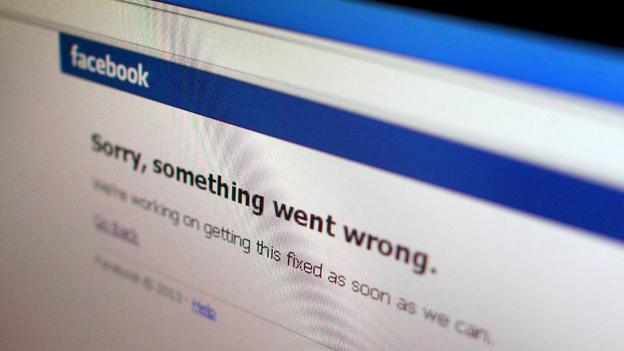Facebook - lessons from the panic
- Published
- comments

The call came at 06:59 as I turned the corner into my street on the way home from walking the dog.
It was a colleague from the Today Programme and his voice was urgent, with an undercurrent of fear. "We need you on the programme in 15 minutes," he said.
"Sure," I replied calmly, and rushed through the door to set up my home broadcasting equipment. Within minutes I was on air, telling the world the terrible news - Facebook was down. Not only that, Instagram and even the dating app Tinder were offline too. And the prime suspects? Lizard Squad, the devilishly clever hacking collective.
Well, I hope by now that you've detected just a smidgeon of irony in my opening paragraphs. But there are perhaps some more serious lessons to be drawn from the 40 minutes of global panic that accompanied the disappearance of these much loved networks.
First of all, we all need to be more cautious about claims of hacking. I will admit that I - along with many others - was too quick to zero in on the Lizard Squad. The group which had chalked up attacks on Sony's Playstation network and Xbox Live before Christmas, had tweeted this some time between 06:00 and 07:00:
"@LizardMafia: Facebook, Instagram, Tinder, AIM, Hipchat #offline #LizardSquad"
Which looked like a claim of responsibility.
But my colleague Dave Lee, who's written about the challenges of reporting cyber-attacks, was dubious. He sent out an internal message warning that this didn't look like Lizard Squad's usual tactics. They normally posted claims just before an attack was launched, not when it was underway, as proof that they were at least in the know.
And soon Dave was proved right. Facebook released a statement confirming that its temporary absence had been due not to an attack but "after we introduced a change that affected our configuration systems".
It must have been embarrassing for the giant social network with its huge team of engineers to have to own up to such a serious foul-up. But I bet the company is relieved that it wasn't a hack attack. That would pose far more worrying questions about its security infrastructure.
And the other lesson is how vital Facebook has become as a means of communication. In days gone by, when phone lines were taken down for days by storms that was a local annoyance but not a global incident. Now it seems that less than an hour in which we can't check out what friends had for dinner - or tell people we've walked the dog - is traumatic for millions.
Still, there is a serious side to all of this. In some parts of the world, the mobile internet is transforming communications and economies - and for many people in Africa Facebook and the internet are synonymous. So let's be grateful that it was a Facebook engineer dropping a virtual spanner into the pipes, not a fiendish hack attack, that disrupted the network this time.